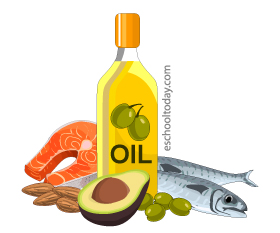- Nutrients in food
Fats in food
Fat is not that bad, as society has made us believe. These days people want to look skinny because they want society to see them in a certain way. But fats in our bodies play an important role, although, more than necessary, the body will begin to have problems.
Why are fats important?
- Fats insulate the body from adverse environmental temperatures. It helps us stay warm when it gets cold.
- Fats keep our skins moisturized and keep them from drying out.
- Fats protect vital blood vessels, organs, joints, and tissues in our body.
When we eat, the body can convert excess energy into fat molecules for storage, to be used at a later time when needed. This is why animals (and humans) can survive longer without food.
Fats are organic compounds that contain hydrocarbons. Lipids are examples of fats. They are part of the building block of living cells. Lipids include waxes, oils, certain vitamins, and hormones. They can all be broken down to release energy.
There are two main types of fats: Saturated fats and Unsaturated fats.

Saturated Fats:
Saturated fats are solid at room temperature. They include lard, butter, hard cheese, and animal fats. They also come from full-fat milk, sausages, biscuits, and pastries.
Saturated fats are high in calories, which is good for the body, but also very harmful as they contain cholesterol. They are stored inside and around vital blood vessels, restricting blood flow from the heart and to the brain. Saturated fats are known to play a part in strokes and heart diseases.

Unsaturated Fats:
Unsaturated fats are liquids at room temperature, and they come in two main types— Monounsaturated fats and polyunsaturated fats. The difference lies in their chemical makeup, and have slightly different health benefits. Monounsaturated fats come from foods like olive and canola oils, nuts, and avocados.
Polyunsaturated fats also come in two types:
